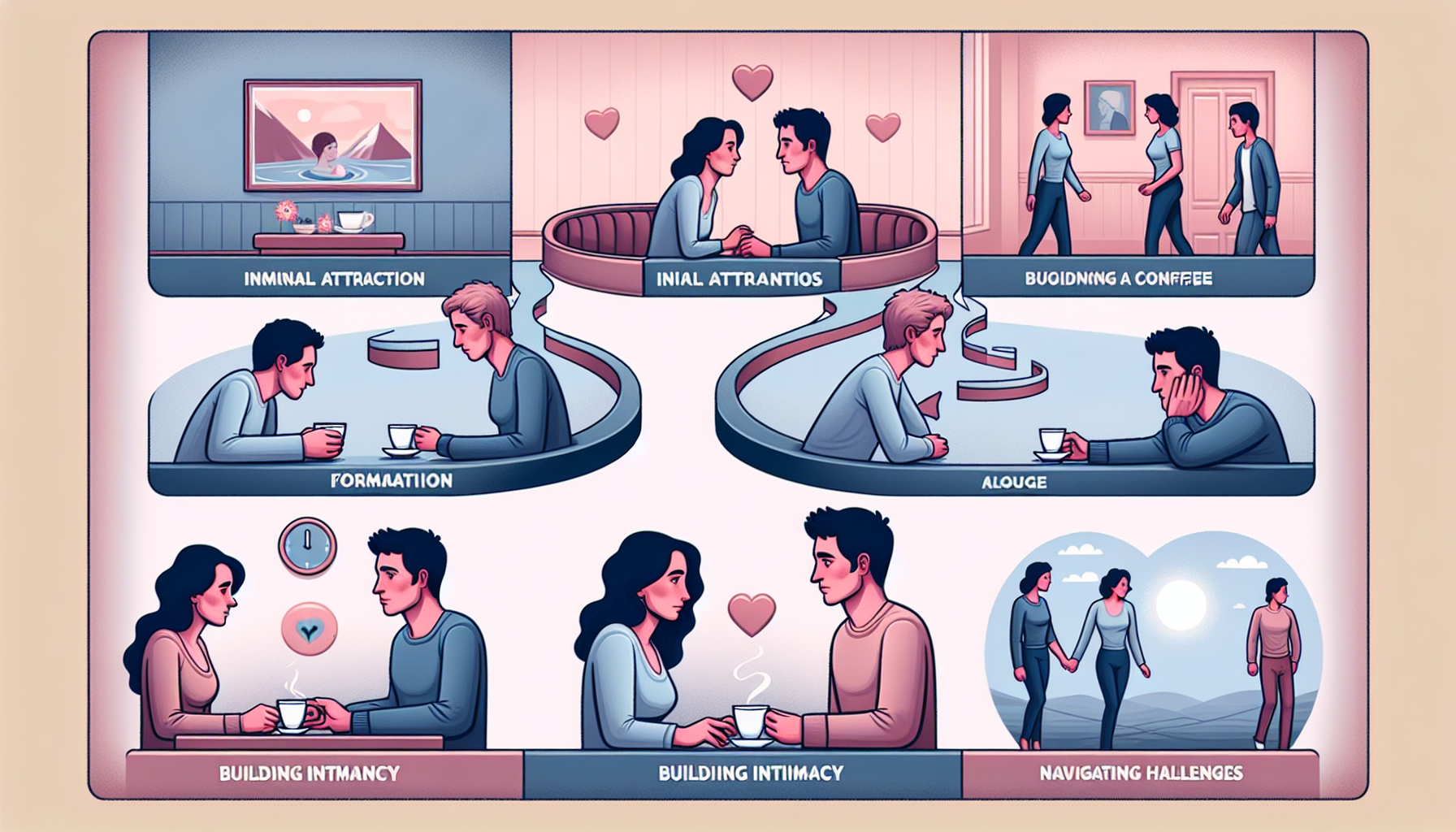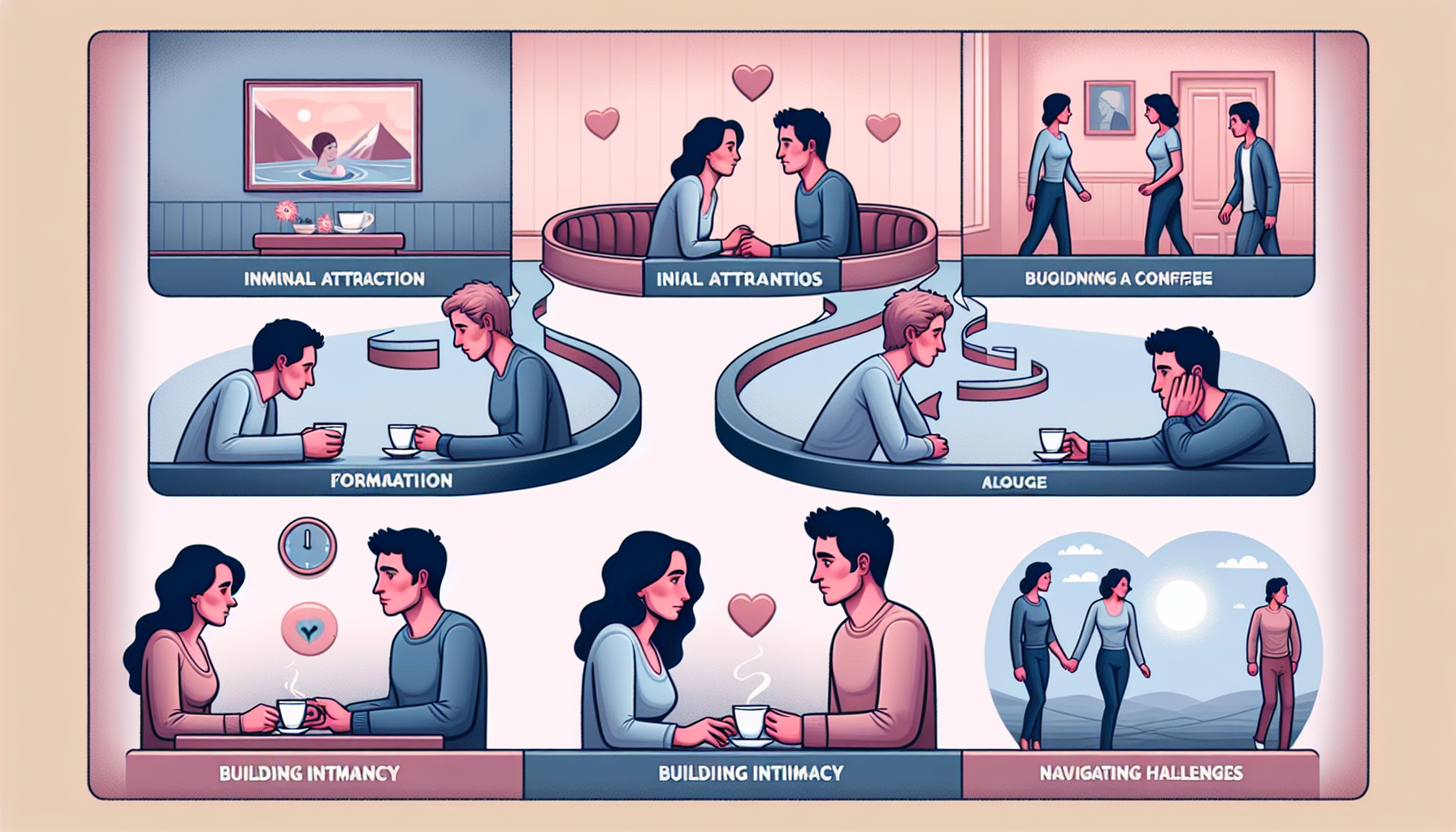
So you’ve started dating someone and you’re wondering how things might progress. Will it be smooth sailing or a rocky journey? In this article, we’ll take a closer look at the various stages that dating typically goes through, from the initial excitement of getting to know each other to establishing a deeper connection. Whether you’re new to the dating scene or have been swirling in its midst for a while, we’ve got you covered with some insights and tips on how dating progresses. Let’s embark on this delightful journey together!
Getting to know each other
Initial attraction
When you first meet someone, there is often a spark or a connection that draws you towards them. This initial attraction can be based on physical appearance, shared interests, or a magnetic personality. You find yourself wanting to know more about this person and spend more time with them to see if the attraction is mutual.
Casual conversation
As you begin to spend more time together, casual conversation becomes the foundation of getting to know each other. You find yourselves engaging in light-hearted chats, exchanging stories, and laughing together. This phase allows you both to share your interests, hobbies, and experiences, laying the groundwork for deeper conversations to come.
Sharing personal information
As trust starts to build between you, sharing personal information becomes more natural. You open up about your childhood, dreams, fears, and past relationships. This vulnerability helps create a deeper connection and establishes a level of intimacy. Sharing personal information is an important milestone in the dating process, as it signals a growing emotional connection.
Building a connection
Spending more time together
As your connection grows, you find yourselves wanting to spend more time together. Dating progresses from casual outings and activities to more significant commitments of time and energy. You may start planning weekends away, attending events together, or simply spending more evenings in each other’s company.
Developing emotional intimacy
During this stage, emotional intimacy begins to develop. You feel comfortable discussing your emotions, fears, and aspirations with each other. You support one another through challenging times and celebrate each other’s successes. This emotional connection creates a strong bond and a sense of security in the relationship.
Creating shared memories
Creating shared memories is an integral part of building a connection. Whether it’s going on adventures, trying new activities, or simply cuddling on the couch watching movies, these shared experiences create a history between you. They become the stories you reminisce about and the foundation upon which you continue to build your relationship.

Defining the relationship
Having the exclusivity talk
As your connection deepens, it becomes important to have the exclusivity talk. This is the conversation where you both communicate your desire to focus exclusively on each other and take the relationship to the next level. The exclusivity talk allows you to establish boundaries and expectations, creating a foundation of trust and commitment.
Discussing long-term goals
To truly define the relationship, it’s crucial to have open and honest discussions about long-term goals. This includes topics such as career aspirations, family plans, and desired lifestyles. These conversations help align your visions for the future and determine if you are compatible in reaching those goals together.
Meeting family and friends
Meeting each other’s family and friends is a significant milestone in a relationship. It shows a level of seriousness and a desire to integrate your lives with each other’s support systems. These interactions provide insight into your partner’s values and background, further deepening your understanding of each other.
Navigating challenges
Dealing with conflicts
No relationship is without its challenges. When conflicts arise, it’s important to tackle them head-on and find constructive resolutions. Effective communication, active listening, and compromise are key in navigating conflicts. Working through challenges together strengthens the bond and builds trust.
Managing differences
As you spend more time together, you will discover differences in opinions, preferences, and habits. Managing these differences requires openness, respect, and a willingness to find common ground. Embracing each other’s unique qualities and finding compromises allows you to grow individually while maintaining a strong connection.
Maintaining trust
Trust is a vital component of any healthy relationship. Building and maintaining trust involves being reliable, honest, and transparent with each other. It also means keeping your commitments and respecting each other’s boundaries. Trust provides a solid foundation for a long-lasting and thriving relationship.

Taking the next steps
Moving in together
Moving in together is a significant step towards building a life together. It offers the opportunity for increased shared experiences, deeper intimacy, and practical planning. Before making this decision, it’s important to discuss expectations about finances, household responsibilities, and long-term goals.
Planning for the future
Planning for the future involves discussing major life decisions such as career advancements, homeownership, and starting a family. These conversations help ensure that both partners are on the same page and committed to building a life together. Planning together allows you to create a roadmap for your shared future.
Considering marriage or commitment
For many couples, marriage or another form of long-term commitment is the ultimate goal. This step signifies a lifelong devotion and a public declaration of your love and commitment to each other. Consider discussing your thoughts and desires on marriage to ensure that you both share the same intentions.
Reevaluating the relationship
Reassessing compatibility
As time goes by, it’s important to periodically reassess the compatibility and alignment between you and your partner. People change and evolve, and so do relationships. Honest reflection and conversation allow you to ensure that you are growing together rather than apart.
Addressing individual needs
Individual needs and desires should always be considered in a healthy relationship. Check-ins with each other can help assess if both partners’ emotional, physical, and mental needs are being met. Open communication and mutual respect are key to addressing and accommodating these needs.
Determining long-term compatibility
Dating progress often involves facing questions about long-term compatibility. Discussing factors such as core values, life goals, and relationship aspirations helps determine if you are compatible in the long run. It’s important to be honest with each other about your desires and assess if you see a future together.
Dealing with stagnation
Reviving the excitement
Relationships can sometimes fall into a rut. To combat stagnation, make an effort to revive the excitement. Surprise each other with date nights, weekend getaways, or new experiences. By injecting newness and spontaneity into your relationship, you can rekindle the spark and create a renewed sense of connection.
Trying new activities
Exploring new activities together can breathe life into a relationship. This can include anything from learning a new sport or hobby to traveling to unfamiliar places. Trying new activities together fosters growth as a couple and allows you to deepen your bond through shared experiences.
Seeking professional help if needed
If stagnation persists and efforts to revitalize the relationship prove challenging, seeking professional help can be beneficial. Relationship counseling can provide guidance and tools to navigate challenges, facilitate open communication, and help you both grow individually and as a couple.
Committing to each other
Discussing long-term commitment
Once you have addressed compatibility, reevaluated the relationship, and worked through any challenges, it may be time to have a conversation about long-term commitment. This discussion involves making a shared commitment to be there for each other through thick and thin, and envisioning a future together.
Deciding to be exclusive
Solidifying your commitment often means deciding to be exclusive. This means both partners agree to focus solely on each other, forsaking other romantic relationships. The decision to be exclusive signifies a deepening commitment and a higher level of trust.
Making future plans together
Once you have committed to each other, it’s time to start making future plans together. This can include anything from setting financial goals to talking about potential travel plans or starting a family. Making joint decisions about the future solidifies your commitment and helps build a life together based on shared dreams and aspirations.
Recognizing red flags
Identifying toxic behaviors
In any relationship, it’s essential to recognize and address toxic behaviors. These can include emotional abuse, manipulation, controlling tendencies, or lack of respect. It’s important to prioritize your emotional well-being and address any red flags that may arise.
Addressing communication issues
Effective communication is at the core of a healthy relationship. If you notice communication issues, such as a lack of openness or difficulty resolving conflicts, it’s important to address them promptly. Seeking professional help or engaging in couples’ therapy can provide valuable tools and support in improving communication.
Prioritizing emotional well-being
It’s crucial to prioritize your emotional well-being in any relationship. If you consistently find yourself feeling unhappy, unsupported, or emotionally drained, it may be a red flag indicating potential incompatibility. It’s important to prioritize your own happiness and seek a relationship where your emotional needs are met.
Celebrating milestones
Anniversaries
As your relationship progresses, milestones such as anniversaries become important to acknowledge and celebrate together. Whether it’s your first date anniversary, the day you became exclusive, or your wedding anniversary, these occasions provide an opportunity to express gratitude and appreciation for each other.
Meeting important milestones
Beyond anniversaries, meeting important personal milestones is another reason to celebrate. This could include achieving career goals, purchasing a home, or welcoming a child into your lives. Recognizing and supporting each other’s accomplishments helps foster a sense of unity and shows your commitment to each other’s individual growth.
Expressing love and appreciation
Never underestimate the power of expressing love, admiration, and appreciation for your partner. Taking the time to show your affection and gratitude through small gestures, kind words, or thoughtful acts can strengthen your bond and create a loving and fulfilling relationship.
Dating is a journey that evolves over time, progressing through various stages of getting to know each other, building a connection, defining the relationship, navigating challenges, and ultimately committing to each other. By understanding and embracing these stages, you can navigate the ups and downs of dating with greater clarity and build a strong foundation for a fulfilling and lasting relationship.




